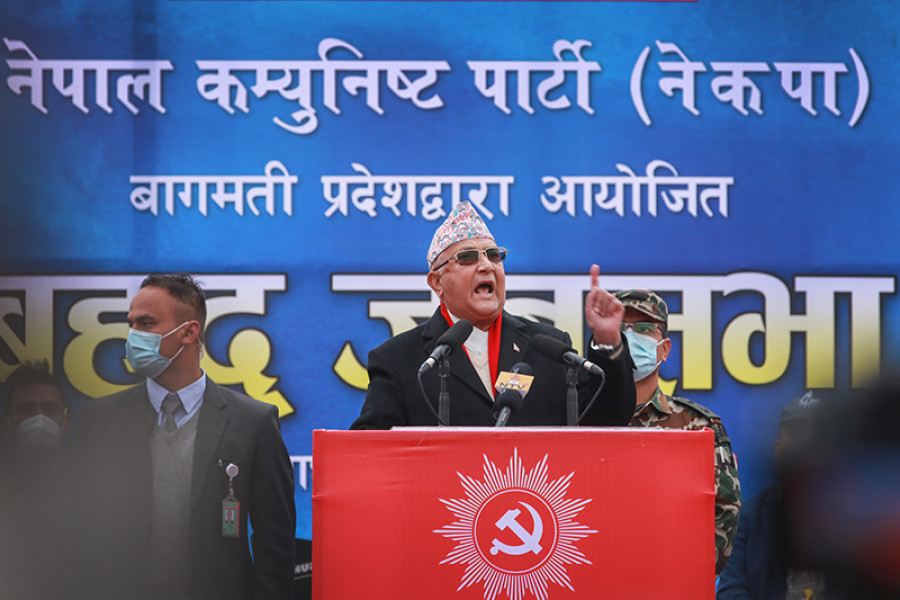Politics
Is Oli right to say he dissolved the House, just the way UK prime minister did?
No. In October 2019 Boris Johnson invoked the Fixed-term Parliaments Act-2011 as per which his election motion was endorsed by more than two-thirds of Members of Parliament.
Post Report
On Friday, while addressing his supporters at a mass rally in Kathmandu, Prime Minister KP Sharma Oli made yet another bid to justify his decision to dissolve the lower house of Parliament. Oli dissolved the House of Representatives on December 20 after he was cornered in his own Nepal Communist Party by his opponents.
Ever since he dissolved the House, Oli has been saying that he was forced to take the step because his opponents did not let him work. He has called snap polls for April 30 and May 10. The constitutionality of Oli’s House dissolution move is currently being tested by the Supreme Court. Those pleading on behalf of the petitioners who have challenged the House dissolution have argued before the court that the current constitution does not allow Oli, as a majority prime minister, to do so.
Those pleading on behalf of Oli, on the other hand, say the prime minister possesses the inherent power to dissolve the House irrespective of whether the constitution has or does not have the provisions. Oli’s lawyers have also cited examples of some other countries, including the United Kingdom, to justify that the House dissolution move is right. On Friday too, while justifying his move, Oli said that though Britain does not have a written constitution, the prime minister [Boris Johson] dissolved Parliament and called snap polls.
Was Oli right?
Here is everything you need to know on Oli’s House dissolution move.
What articles has Oli cited to dissolve the House?
Oli cited Articles 85, 76 (1) and 76 (7) to recommend that the President dissolve the House of Representatives. In a notice published on December 20, the Office of the President said President Bidya Devi Bhandari approved the recommendation, pursuant to Article 76 (1) and (7) and Article 85 of the constitution, by the Council of Ministers to dissolve the House of Representatives. The President also approved the Cabinet’s recommendation to hold general elections on April 30 and May 10.
What do the articles say?
Article 85 (1) states that unless dissolved earlier pursuant to this constitution, the term of the House of Representatives shall be of five years. Constitutional experts say since it was established in 2018 following elections under the new constitution in November-December 2017, the House of Representatives has not been dissolved earlier, and therefore its term shall be five years.
Article 76, however, has different clauses related to situations when the prime minister appointed to lead the government in a hung Parliament cannot get the required majority vote with support from another party or other parties.
Article 76 (1) says: The President shall appoint the leader of a parliamentary party that commands majority in the House of Representatives as the prime minister, and the Council of Ministers shall be constituted under his or her chairpersonship.
Another provision that Oli has cited to dissolve the House is from 76 (7), which states: “In cases where the prime minister appointed under clause (5) fails to obtain a vote of confidence or the prime minister cannot be appointed, the President shall, on recommendation of the Prime Minister, dissolve the House of Representatives and appoint a date of election so that the election to another House of Representatives is completed within six months.”
Clause 5 relates to the appointment of the prime minister in a hung parliament.
Article 76 (7) is the only clause in the constitution that stipulates the House dissolution conditions. But since Oli was appointed prime minister as per Article 76 (2), constitutional experts say Article 76 (7) could not be invoked.
Article 76 (2) says: “In cases where no party has a clear majority in the House of Representatives under Clause 1, the President shall appoint as the prime minister a member of the House of Representatives who can command a majority with the support of two or more parties in the House of Representatives.
When Oli was sworn in as prime minister in February 2018, his CPN-UML, which did not have a clear majority, had formed the government with the support of then CPN (Maoist Centre). The two parties merged in May 2018.
Are Oli and his lawyers right to argue that like in the United Kingdom, where the constitution does not say anything on House dissolution but the prime minister can still dissolve Parliament?
No.
What stipulates House dissolution and early general elections in the United Kingdom?
While Oli was right in saying that Britain does not have a written constitution, he was wrong to say that the prime minister dissolved the House despite nothing written about such a move.
Johnson’s House dissolution move was based on the Fixed-term Parliaments Act 2011.
What does the Fixed-term Parliaments Act 2011 stipulate?
The Fixed-term Parliaments Act 2011 sets a five-year interval between general elections, which are scheduled for the first Thursday in May every fifth year.
But that does not mean early elections cannot be held.
The Act has two pre-conditions for early polls: If a motion for an early general election is agreed either by at least two-thirds of the whole House (434 of the 650 Members of Parliament); or if a motion of no confidence is passed and no alternative government is confirmed by the House of Commons within 14 days.
Previously Parliament was dissolved by the Queen, on the advice of the prime minister, but with the Act in place, Parliament can only be dissolved in accordance with the Act.
What prompted the United Kingdom to enact the Fixed-term Parliaments Act 2011.
Here is some parallel though–stability.
The Fixed-term Parliaments Act 2011 was enacted in a bid to achieve stability by making it hard for parties to bring the government down and force another election.
After the 2010 general election, various factors, including the Great Recession of 2008 and Prime Minister Tony Blair’s support for the Iraq War, resulted in a surge in votes for both the Liberal Democrats (an economically centrist, pro-European party that opposed the war) and a range of small regional parties. No party had a majority in Parliament.
The Conservatives with 306 Members of Parliament and the Liberal Democrats 57 MPs negotiated a coalition agreement to form a government, and a commitment to legislate for fixed-term Parliament was included in the coalition deal.
The coalition government introduced the Act, denying the prime minister the authority to unilaterally call fresh elections.
In October 2019, Boris Johnson, who took over as the new British prime minister after Theresa May in June that year, called a general election for December 12 to break Britain’s Brexit impasse invoking the Fixed-term Parliaments Act 2011. Johnson’s election motion was endorsed by 438 to 20 votes in Parliament.
Why complicated provisions were incorporated in Nepal constitution regarding House dissolution?
Under the 1990 constitution, at least four prime ministers attempted House dissolution–two were upheld by the court, as many were turned down. The 1990 constitution had an explicit provision under Article 53, granting the prime minister power to recommend House dissolution. Drafters of the 2015 constitution say difficult provisions were made in the constitution, denying the prime minister the authority to dissolve Parliament on a whim. In a 2019 video, which had recently surfaced, the two-time chair of the Constituent Assembly, Subas Nembang is heard saying a [majority] prime minister cannot dissolve the House.




 27.41°C Kathmandu
27.41°C Kathmandu












